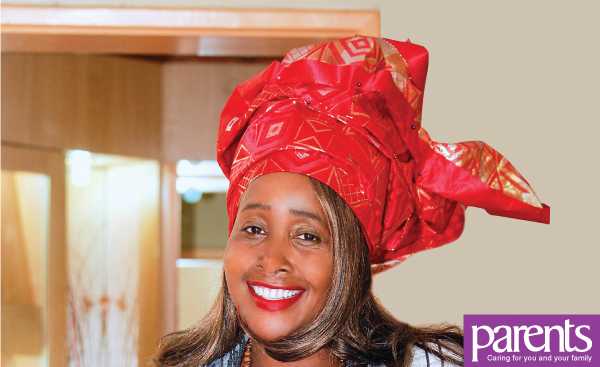EMILY TANUI KORIR Finding life’s purpose after STROKE
When you first meet Emily Tanui Korir, it is difficult to imagine she suffered a massive stroke four years ago that almost killed her. She is bubbly, energetic and a

When you first meet Emily Tanui Korir, it is difficult to imagine she suffered a massive stroke four years ago that almost killed her. She is bubbly, energetic and a classic example that one can make the best out of a catastrophe. Having overcome a stroke to lead a normal life, Emily is now at the forefront creating awareness on strokes and brain injury. She had a candid talk with ESTHER KIRAGU about her near-death experience that revolutionalised her life.
In 2012, at the age of 37, Emily Korir Tanui was a healthy career woman working as a human resource strategist in the healthcare sector in Australia. That same year, she suffered a stroke. She explains, “At the time, I had resumed work a few months earlier from maternity leave. My husband on the other hand had just finished his term as president of the Kenyan Association in Australia where we were involved in a lot of community work, and our daughter was participating in tennis competition for the state. Life was good!”
Emily recounts the events of the day the stroke struck her. She was at home in the company of her husband, Bernard Tanui, and her then seven-year-old daughter, Britney, and her then eight-month-old son, Bradley, when she experienced a sudden, sharp headache. She was getting ready for her friend’s surprise birthday party, where she was going to be the emcee. She reached out for some painkillers but weirdly, they kept slipping off her hands.
Stroke struck…
“I would pick them and before knowing it drop them on the floor. My daughter, who was watching me the entire time, asked me to stop playing with medication. All of a sudden, everything went dark. It was only later that I learnt that I fell down and Britney screamt for help. Her dad came to my rescue and called for an ambulance immediately,” she explains.
Not long after, the paramedics were at the scene trying to save her life. It was then that her family and friends would begin to understand the magnitude of what ailed Emily – she had suffered a stroke. At the hospital, she was put on life support, as she had gone into a coma. When she came to a week later, family and friends whom she couldn’t recognise surrounded her at her bedside.
“My husband seemed familiar to me but I couldn’t figure out who he was exactly. I also couldn’t remember my children. My son, who was being exclusively breastfed at the time, suffered severe allergy (anaphylactic) – a low lactose-tolerance, and he couldn’t take pasteurised or powdered milk. This was a difficult period not only for me, but for my family too,” she recounts.
For the next 12 months, Emily had to go through a long and painful journey to recovery. She was in hospital for about two months before she was referred to a rehabilitation centre as she had lost her speech and the right side of her body was paralysed.
“Being at the rehabilitation centre was a very difficult and emotional period especially when I felt I had made no progress. I longed to go home and be with my family and this became my driving force to get better. I am grateful that medical care is free for all in Australia, as I didn’t pay a dime for the entire period I was hospitalised and during my one-year of rehabilitation,” says Emily who remains indebted to her family as well as paramedics and friends who stood with her during that difficult period.
Emily, who has been married for 12 years to Bernard, says of her husband; “He is my rock,” with obvious love for the man who remained true to his wedding vows, especially in the trying times when she suffered a stroke.
Beating odds to pursue her dream…
At some point during her rehabilitation, Emily recalls making progress and being able to count to three. Excited, she told her speech therapist that her recovery progress had inspired her to go back to university to study a Master’s degree in business administration (MBA), which she wanted to pursue prior to the stroke. “The doctor explained to me the seriousness of my condition and that it would be years before I could do that. My heart sunk. I took her words and vowed to prove her wrong,” she says.
After completing 12 months of rehabilitation, she applied for online studies at the Australian Institute of Business and was accepted. Afraid of being denied a learning opportunity based on her health, she kept her medical condition a secret. The course had a mandatory three-hour examination as a requirement, which she could not complete because she suffered from paralysis and cognitive fatigue during the exam.
“I had to come clean about having suffered a stroke and had just completed rehabilitation. To my amazement, the school made special provisions for me and when I passed, they made adjustments to accommodate and was given the option of completing my MBA in 12 months or three years. Although I knew I had three years if I needed the time, my aim was to complete the MBA in 12 months. I was so determined that I wanted my story to be a testament that no matter what obstacle one faces in life, if you put your mind to something, you can achieve it. I graduated with an MBA in 2014 to the disbelief of many people and doctors admitted that I defied everything by the doctor’s book. I truly believe this took the hand of God, as I have no other explanation,” she says.
Emily had a difficult time getting a job. “I lost my job when I suffered the stroke as doctors couldn’t give my employer an exact period of time when I would recover and resume work, because even they didn’t know. My efforts to get another job were futile, as employers kept saying no to me once they found out I had suffered a stroke. It became obvious that my disability was the issue,” narrates Emily saying stroke is categorised as a form of disability.
A true definition of resilience and strength, she purposed to understand about disability and advocate for people with disabilities. She thus enrolled for a Masters degree in disability, policy and practice at the Flinders University in 2014. She enrolled for yet another Graduate Diploma in disability in developing countries and international inclusive development at the University of Melbourne in 2015. Emily is on her PhD focussing on Women with disabilities in developing countries. She will carry out 80 per cent of her research data in Kenya..
Emily hopes to make a difference in Kenya on issues of disabilities. For now, she is playing her role while in Australia and visits Kenya from time to time. She also engages Kenyans on social media on matters to do with disability. She hopes to eventually return home and be fully occupied with disability issues. Currently in Kenya, Emily is lobbying lawmakers on inclusive rehabilitation with the aim of seeing a rehabilitation centre in every county.
“Disability is a spectrum and policies and practices need to address each disability spectrum instead of putting it under one umbrella. I would also like disability issues segmented further in terms of gender as women are affected differently by disability in comparison to men, and it is difficult to address that if they are put in one bucket,” she says passionately.
A leader on many fronts…
Emily wears many hats. She is based in Australia where she works as a senior technical advisor of disability-inclusive development. A large part of her work includes developing, supporting and coordinating the implementation of the strategic vision for disability-inclusive development internationally. She is also the ambassador for community-based rehabilitation, where she liaises with non-governmental organisations, government and the private sector on disability inclusion issues.
She has served as the president of My Sister’s Keeper, a not-for-profit organisation whose aim is to provide support and empowerment to migrant and refugee women and girls. She has also worked as the chief executive officer of Migrant and Refugee Support Services.
Further to her work and volunteer roles, Emily has received accolades for her ongoing efforts to raise stroke awareness, disability and inclusion and bring hope to stroke survivors and their loved ones. She was voted the Young Leader of the Year at the celebration of African Australians for making a difference in the community. She was also recognised at the UN International Women’s Day with the Irene Krastev Award.
As an acknowledgment for her dedication towards raising awareness of stroke, the Kenya Stroke Association appointed her as the Kenya Stroke Ambassador in 2014. Now aware of the risk factors to stroke, Emily leads an active life; exercising regularly to keep fit in addition to eating a healthy diet. Her message is that stroke can strike anyone at any age and so it is important to take care of one’s lifestyle. She still sees her psychologist and remains on high blood pressure medication due to hypertension to avoid a relapse.
Emily is currently writing a book to share her life story and serve as an encouragement to others. She is determined to use her knowledge and experience to challenge current policies and systems, and fight for disability inclusion.
esther@parents.co.ke
Published in February 2016




